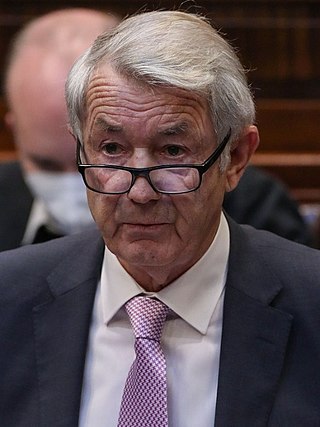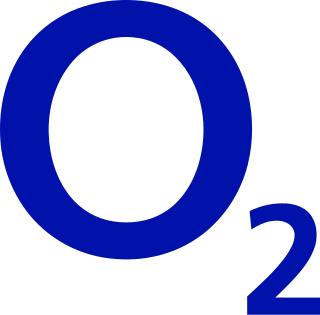
United States appellate procedure involves the rules and regulations for filing appeals in state courts and federal courts. The nature of an appeal can vary greatly depending on the type of case and the rules of the court in the jurisdiction where the case was prosecuted. There are many types of standard of review for appeals, such as de novo and abuse of discretion. However, most appeals begin when a party files a petition for review to a higher court for the purpose of overturning the lower court's decision.

Michael Lowry is an Irish independent politician who has served as a Teachta Dála (TD) since 1987, currently for the Tipperary constituency. He previously served as Minister for Transport, Energy and Communications from 1994 to 1996 and Chairman of the Fine Gael Parliamentary Party from 1993 to 1994.

Telefónica Ireland was a broadband and telecommunications provider in Ireland that traded under the O2 brand (typeset as O2). O2 Ireland was previously called Esat Digifone when it was owned by Esat Telecommunications (and Telenor) from 1997 to 2006.

BT Communications (Ireland) Limited is a telecommunications and internet company in Ireland. It is a subsidiary of BT Group plc.

Denis O'Brien is an Irish billionaire businessman, and the founder and owner of Digicel. He was listed among the World's Top 200 Billionaires in 2015 and was Ireland's richest native-born citizen for a period of several years. His business interests have also extended to aircraft leasing, utilities support (Actavo), petroleum, football, and healthcare. As former chairman of the Esat Digifone consortium, O'Brien was questioned by the Moriarty Tribunal, which investigated the awarding of a mobile phone licence to Esat, among other things.
The Moriarty Tribunal, officially called the Tribunal of Inquiry into certain Payments to Politicians and Related Matters, was an Irish Tribunal of Inquiry established in 1997 into the financial affairs of politicians Charles Haughey and Michael Lowry. It has revealed significant tax evasion by these and other politicians and leading businessmen. As a consequence, the tax authorities have recovered millions of euro in settlements and penalties from many individuals. The final report of the tribunal was expected to be published in mid-January 2010, but was delayed and was published 22 March 2011.
Since at least the 1970s, many Irish political scandals relating to miscarriage of justice, dereliction of duty and corruption by public officials have resulted in the establishment of extra-judicial Tribunals of Enquiry, which are typically chaired by retired High-Court judges and cannot make judgements against any of the parties. Since 2004 many such scandals have been investigated by the less costly but less transparent Commissions of Investigation. Many Irish scandals, however, have not resulted in trials or public enquiries.

Transparency International's 2022 Corruption Perceptions Index scores Ireland at 77 on a scale from 0 to 100. When ranked by score, Ireland ranked 10th among the 180 countries in the Index, where the country ranked first is perceived to have the most honest public sector. For comparison, the best score was 90, the worst score was 12, and the average score was 43.
It is alleged that as a result of benefits extended to Michael Lowry by Denis O'Brien that Esat Digifone was given an unfair advantage in the procurement of a mobile phone operator's licence.

The New South Wales Civil and Administrative Tribunal (NCAT) is a civil law and administrative law tribunal in New South Wales established by statute on 1 January 2014.
Sam Smyth is an investigative reporter, columnist and broadcaster. He works for the Irish Mail on Sunday and formerly worked for Irish Independent, Sunday Independent, Sunday Tribune newspapers.

In Blood v DPP [2005] IESC 8, the Irish Supreme Court confirmed that a right to an expeditious trial is implied in the right to a fair trial under Irish law. The decision of McGuinness J further suggested that "blameworthy prosecution delay was insufficient without some evidence of prejudice to the accused, whether in the form of a real risk of an unfair trial or stress and anxiety arising from the delay". The applicant in the case was successful in their appeal.

Vincent Sweeney v Governor of Loughlan House Open Centre and Others [2014] 2 ILRM 401; [2014] IESC 42; [2014] 2 IR 732, was an Irish Supreme Court case in which the Court held that the sentenced served in the administrating state should be of the same legal nature as the sentence imposed by the sentencing state. This decision reversed a previous decision by the High Court that Sweeney's incarceration violated the Transfer of Sentenced Persons Acts 1995 and 1997.

P.M. v District Judge Miriam Malone and the Director of Public Prosecutions[2002] IESC 46 is an Irish Supreme Court case in which the court barred the further prosecution of a man for the alleged sexual abuse of his sister due to the nature of the offences and on the grounds of the pre-charge delay in criminal prosecution. A "inordinate" delay of seven years before the man was charged, coupled with the nature of the offences being described as "a form of sexual experimentation between two children under the age of ten" led to the decision of the court.

McFarlane v. Director of Public Prosecutions[2008] IESC 7; [2008] 2 I.R. 117 is an Irish Supreme Court case in which the Court ruled that the right to a fair trial under both Article 38.1 of the Constitution and Article 6(1) of the European Convention on Human Rights does not preclude prosecution in cases of prosecutorial delay unless the accused can demonstrate either that some specific prejudice resulted or that the delay was well outside the norm for the particular proceedings.

N.H.V. v Minister for Justice & Equality [2017] IESC 35 was an Irish Supreme Court case in which the Court upheld a challenge to the absolute prohibition on employment of asylum seekers contained in Section 9(4) of the Refugee Act 1996 and held it to be contrary to the constitutional right to seek employment.

Gerald J.P. Stephens v. Paul Flynn Ltd.[2008] IESC 4; [2008] 4 IR 31 was an Irish Supreme Court case in which the Court ruled that, absent special circumstances, a party's failure to deliver a statement of claim within a period of twenty months is inexcusable and will justify dismissal of the litigation.

A v Minister for Justice and Equality, Refugee Applications Commissioner, Ireland and the Attorney General[2013] IESC 18, (2013) 2 ILRM 457 is an Irish Supreme Court case where the Supreme Court concluded that a certificate of leave to appeal was not required in order to appeal to the Supreme Court a decision of the High Court to dismiss proceedings as frivolous or vexatious.

Sir Michael John Fordham,, styled The Hon. Mr Justice Fordham, is a judge of the High Court of England and Wales assigned to the King's Bench Division. He was appointed as a Justice of the High Court on 13 January 2020.









